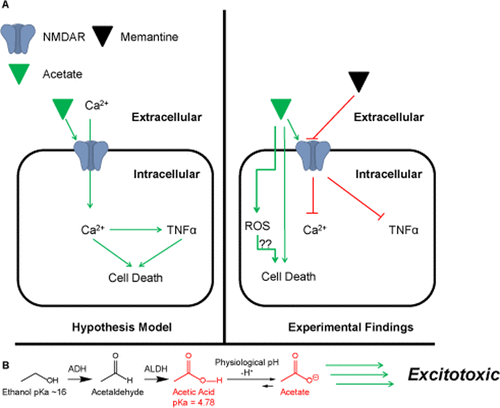当前位置:
X-MOL 学术
›
ACS Chem. Neurosci.
›
论文详情
Our official English website, www.x-mol.net, welcomes your feedback! (Note: you will need to create a separate account there.)
Acetate Mediates Alcohol Excitotoxicity in Dopaminergic-like PC12 Cells.
ACS Chemical Neuroscience ( IF 5 ) Pub Date : 2018-10-15 , DOI: 10.1021/acschemneuro.8b00189 Andrew D Chapp 1, 2 , Jessica E Behnke 2 , Kyle M Driscoll 2 , Yuanyuan Fan 1 , Eileen Hoban 2 , Zhiying Shan 1, 2 , Li Zhang 3 , Qing-Hui Chen 1, 2
ACS Chemical Neuroscience ( IF 5 ) Pub Date : 2018-10-15 , DOI: 10.1021/acschemneuro.8b00189 Andrew D Chapp 1, 2 , Jessica E Behnke 2 , Kyle M Driscoll 2 , Yuanyuan Fan 1 , Eileen Hoban 2 , Zhiying Shan 1, 2 , Li Zhang 3 , Qing-Hui Chen 1, 2
Affiliation

|
Neuronal excitotoxicity is the major cause of alcohol-related brain damage, yet the underlying mechanism remains poorly understood. Using dopaminergic-like PC12 cells, we evaluated the effect of N-methyl-d-aspartate receptors (NMDAR) on acetate-induced changes in PC12 cells: cell death, cytosolic calcium, and expression levels of the pro-inflammatory cytokine tumor necrosis factor alpha (TNFα). Treatment of PC12 cells with increasing concentrations of acetate for 4 h caused a dose-dependent increase in the percentage of cells staining positive for cell death using propidium iodide (PI) exclusion and cytosolic reactive oxygen species (ROS) using cell ROX detection analyzed via flow cytometry. The EC50 value for acetate was calculated and found to be 4.40 mM for PI and 1.81 mM for ROS. Ethanol up to 100 mM had no apparent changes in the percent of cells staining positive for PI or ROS. Acetate (6 mM) treatment caused an increase in cytosolic calcium measured in real-time with Fluo-4AM, which was abolished by coapplication with the NMDAR blocker memantine (10 μM). Furthermore, cells treated with acetate (6 mM) for 4 h had increased expression levels of TNFα relative to control, which was abolished by coapplication of memantine (10 μM). Co-application of acetate (6 mM) and memantine had no apparent reduction in acetate-induced cell death. These findings suggest that acetate is capable of increasing cytosolic calcium concentrations and expression levels of the pro-inflammatory cytokine TNFα through an NMDAR-dependent mechanism. Cell death from acetate was not reduced through NMDAR blockade, suggesting alternative pathways independent of NMDAR activation for excitotoxicity.
中文翻译:

乙酸盐介导多巴胺能样PC12细胞中的酒精兴奋性毒性。
神经元兴奋性毒性是酒精相关性脑损伤的主要原因,但其潜在机制仍知之甚少。使用多巴胺能样PC12细胞,我们评估了N-甲基-d-天冬氨酸受体(NMDAR)对乙酸盐诱导的PC12细胞变化的影响:细胞死亡,胞质钙和促炎性细胞因子肿瘤坏死因子的表达水平α(TNFα)。使用碘化丙锭(PI)排除法和通过流分析的细胞ROX检测的胞质活性氧(ROS),用乙酸盐浓度升高的PC12细胞处理4小时会导致细胞死亡阳性染色的细胞百分比呈剂量依赖性增加细胞计数。计算出乙酸盐的EC50值,发现PI的EC50值为4.40 mM,ROS的EC50值为1.81 mM。乙醇至100 mM对PI或ROS染色呈阳性的细胞百分比没有明显变化。醋酸盐(6 mM)处理导致使用Fluo-4AM实时测量的胞浆钙增加,与NMDAR阻断剂美金刚(10μM)并用时,这被取消。此外,用醋酸盐(6 mM)处理4 h的细胞相对于对照具有增加的TNFα表达水平,这与美金刚的共同应用(10μM)取消了。醋酸盐(6 mM)和美金刚的共同应用没有明显减少醋酸盐诱导的细胞死亡。这些发现表明乙酸盐能够通过依赖于NMDAR的机制增加细胞内钙的浓度和促炎性细胞因子TNFα的表达水平。NMDAR阻滞并没有减少醋酸盐引起的细胞死亡,
更新日期:2018-09-24
中文翻译:

乙酸盐介导多巴胺能样PC12细胞中的酒精兴奋性毒性。
神经元兴奋性毒性是酒精相关性脑损伤的主要原因,但其潜在机制仍知之甚少。使用多巴胺能样PC12细胞,我们评估了N-甲基-d-天冬氨酸受体(NMDAR)对乙酸盐诱导的PC12细胞变化的影响:细胞死亡,胞质钙和促炎性细胞因子肿瘤坏死因子的表达水平α(TNFα)。使用碘化丙锭(PI)排除法和通过流分析的细胞ROX检测的胞质活性氧(ROS),用乙酸盐浓度升高的PC12细胞处理4小时会导致细胞死亡阳性染色的细胞百分比呈剂量依赖性增加细胞计数。计算出乙酸盐的EC50值,发现PI的EC50值为4.40 mM,ROS的EC50值为1.81 mM。乙醇至100 mM对PI或ROS染色呈阳性的细胞百分比没有明显变化。醋酸盐(6 mM)处理导致使用Fluo-4AM实时测量的胞浆钙增加,与NMDAR阻断剂美金刚(10μM)并用时,这被取消。此外,用醋酸盐(6 mM)处理4 h的细胞相对于对照具有增加的TNFα表达水平,这与美金刚的共同应用(10μM)取消了。醋酸盐(6 mM)和美金刚的共同应用没有明显减少醋酸盐诱导的细胞死亡。这些发现表明乙酸盐能够通过依赖于NMDAR的机制增加细胞内钙的浓度和促炎性细胞因子TNFα的表达水平。NMDAR阻滞并没有减少醋酸盐引起的细胞死亡,



























 京公网安备 11010802027423号
京公网安备 11010802027423号